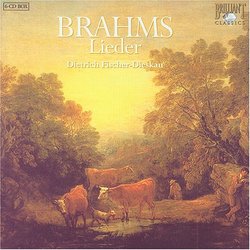| All Artists: Johannes Brahms, Dietrich Fischer-Dieskau, Gerlad Moore, Wolfgang Sawallisch, Sviatoslav Richter, Daniel Barenboim Title: Brahms: Lieder Members Wishing: 0 Total Copies: 0 Label: Brilliant Classics Release Date: 2/28/2006 Album Type: Import Genres: Pop, Classical Styles: Vocal Pop, Opera & Classical Vocal, Chamber Music, Historical Periods, Baroque (c.1600-1750), Classical (c.1770-1830), Modern, 20th, & 21st Century Number of Discs: 6 SwapaCD Credits: 6 UPC: 842977028911 |
Search - Johannes Brahms, Dietrich Fischer-Dieskau, Gerlad Moore :: Brahms: Lieder
 | Johannes Brahms, Dietrich Fischer-Dieskau, Gerlad Moore Brahms: Lieder Genres: Pop, Classical
|
Larger Image |
CD DetailsSimilar CDs |
CD ReviewsDietrich Fischer-Dieskau Sings Brahms Robin Friedman | Washington, D.C. United States | 05/19/2006 (5 out of 5 stars) "Many informed music lovers know Brahms primarily through his large scale works: the symphonies, concertos, chamber music, and German Requiem. There is a tendency to overlook Brahms as a composer of songs. This is unfortunate as it tends to obscure the lyrical, intimate side of Brahms, throughout his work, by concentrating the listener's attention on Brahms as a master of large-scale form. Brahms's approximately 200 songs show a more intimate side of the composer and are well-worth hearing. They are lovely in their own right, and they will give the listener a deeper understanding of the Brahms of the symphonies and other extended pieces. This six-CD set of Brahms lieder offers an overview of Brahms'song output from the beginning of his career to the end. Brahms, indeed, composed songs throughout his career. In these CDs, Dietrich Fisher- Dieskau is accompanied by four pianists: Gerald Moore, Wolfgang Swallisch, Daniel Barenboim, and Sviatoslav Richter. Thus it presents the listener with a variety of sylistic approaches to the accompaniment of lieder. Most of Brahms's songs are simple and melodic. Brahms generally focuses on the mood of the song as a whole and does not try to shape phrases around specific words. Some of the songs will appear spare to those knowing the songs of Schubert or Schumann. Many show the great influence of folk music. Brahms's themes are, broadly, love found and love lost with the latter predominating as the composer grows older. Brahms tended to set texts by poets whom he knew or who grew up in his own home town of Hamburg. Many of Brahms' better-known songs are in this collection, including, of course, the "Lullaby." Fischer-Dieskau sings Brahms's near-final work the "Four Serious Songs" opus 121 with great solemnity. This work was written upon the death of Clara Schumann. Another well-known song is "Regenlied" which Brahms used as the theme for the finale of his first sonata for violin and piano. There is much to be discovered in this compilation by repeated listening. I particularly enjoyed the performance of Brahms's rarely-performed song-cycle "Die Schone Magelone" opus 33 in which Fischer-Dieskau is accompanied by Richter. This is a large-scale dramatic and romantic work, unlike most of the shorter songs. In it Brahms poured forth intimate feelings to a degree rare in the works he composed before or after. The cycle sets 15 poems by Ludwig Tieck and tells a story of medieval courtly love lost and, ultimately, won . It is intense and personal music. I found it useful to get to know Brahms's songs through a cross-section beautifully performed by Fischer-Dieskau rather than to approach them piecemeal through individual recordings. Until recently, this set was available on EMI at a price nearly double the current price of the collection on Brilliant, making this new Brilliant release a real find. This set will open to the listener the world of Brahms' songs. This compilation should be irrestible to lovers of art song. It will show those familiar with Brahms's more famous works a new side of the composer. Robin Friedman " BRAHMS AND FRIENDS DAVID BRYSON | Glossop Derbyshire England | 05/21/2008 (5 out of 5 stars) "Brahms's total output of solo songs does not approach Schubert's 606 and I have never known the exact figure, but here are 164 of them to be going on with, and I think that constitutes a very high percentage.
The baritone voice is the timbre I generally find best suited to Brahms, and on these six discs we hear a lyric baritone among lyric baritones. This is one of the greatest voices of the 20th century, and I expect indeed of any century. To this God-given endowment Fischer-Dieskau brings artistry and professionalism of the highest and strictest order. You will find total technical perfection applied to the first song here: you will find loving understanding lavished on the 164th; and you will find both in equal measure in each and every one. Lyricism is the first and foremost requirement. Most of the poems here are what we would term `lyrics', although there are a few ballads and of course there are the four awesome biblical settings op 121. However Brahms, unlike his great contemporary songwriter Wolf but like Bach, is an `absolute' musician through and through. Music, not literary considerations, has primacy even more than it has in the songs of Schubert. However the tradition that Brahms embodies is that of Schubert, influenced along the way mainly, I believe, by Mendelssohn. The stylistic descent from Schubert shows mainly in the vocal line, as is not surprising from a composer whose melodic gift rivals Schubert's own. However the piano parts go far beyond Schubert. It is in these that I think I hear Mendelssohn's influence, because in both Mendelssohn and Brahms the piano-writing is that of a proficient pianist. It is still `accompaniment' and not equal partnership as in Wolf, but the piano is no longer content to stay beneath the voice but often ventures boldly up into the voice's territory. What this must imply is that the piano-playing is of crucial importance, and we have on these six discs three players of high distinction, plus one who rates a description well beyond that. I prefer the style and touch of Sawallisch to that of Moore or Barenboim because he lets more air into the texture. They all do well, but for me he does best, and so I was pleased to note that on the fourth disc Sawallisch does not hand over to Barenboim until after the Four Serious Songs. He starts these magnificently, and Fischer-Dieskau is able to darken his voice in a natural and impressive way, delivering a magnificent low note on `Toten' in the second song. All the sadder, then, that the one thing that is flunked in 164 songs is the greatest moment in the greatest of all Brahms's songs, the phrase beginning `Nun aber bleibet...' in the fourth of these four. I would have liked more `sense of occasion' from Fischer-Dieskau, but above all what happened to the stupendous chord at `Liebe'? This should be the Lost Chord itself, but here it is disappointingly normal. However there is a compensation. In the 15-song Magalone cycle the player is no less than Richter, and Richter at his wonderful best. It is not so much a matter of the insight shown as one of sheer pianistic talent, and if you want to hear how Brahms's piano-writing can sound comely and graceful without loss of power and grandeur, and do so because the control and balance of the player's touch are pure perfection, this is where you can hear it. In terms of quantity, these discs represent outstanding value. The sound is excellent throughout, although the effect is startlingly different between the first and second discs. The German text of the songs is given, but nothing more - no translation(s), no liner comment. We should just be thankful for what we are given, especially as the German is very accurately printed. Here and there the editors tag this or that line or stanza as `not set by Brahms', in case we had not noticed. They may perhaps thank me for noticing that in op 43/2 the second stanza is not set either, and in op 72/3 only the first and third stanzas are sung, so I must suppose that only they are set. In opp 48/7 and 57/3 I heard some minor divergences from my text, for whatever reason, and in op 94/5 I suspect that the first four lines (not sung) do not even belong there. Otherwise the only unresolved issue for me is how the poem to op 14/4 manages to have acquired the title `Sonnet'. In one word - `terrific'. " |

 Track Listings (30) - Disc #1
Track Listings (30) - Disc #1![Hugo Wolf: Lieder & Orchesterwerke [Box Set]](https://nationalbookswap.com/cd//m/01/0001/6120001.jpg)
![Schubert: Lieder [Box Set]](https://nationalbookswap.com/cd//m/32/1932/6131932.jpg)
![Schumann: Lieder [Box Set]](https://nationalbookswap.com/cd//m/83/7883/6177883.jpg)
